新概念第二册Lesson34~35课件(共57张PPT)
文档属性
| 名称 | 新概念第二册Lesson34~35课件(共57张PPT) | 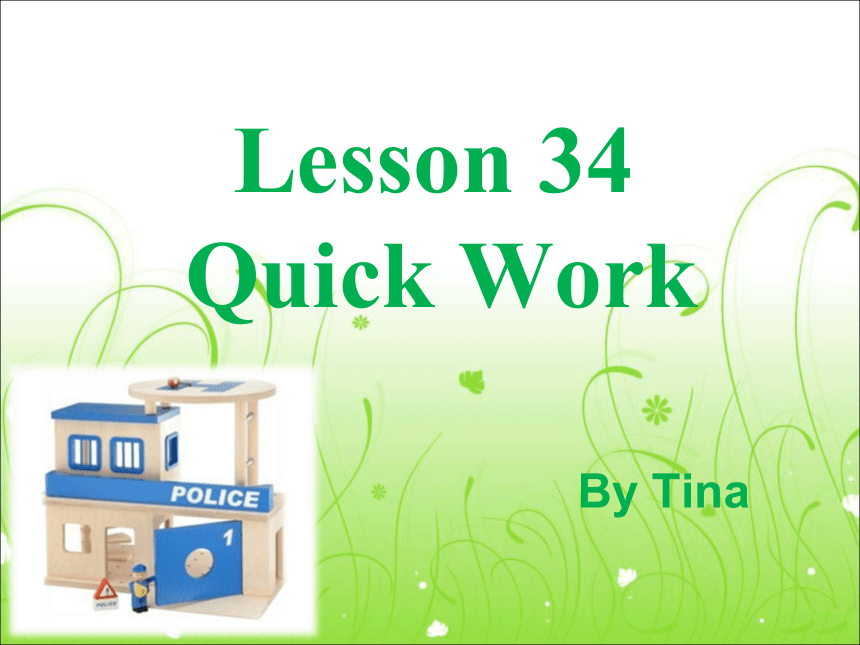 | |
| 格式 | pptx | ||
| 文件大小 | 1.9MB | ||
| 资源类型 | 教案 | ||
| 版本资源 | 新概念英语 | ||
| 科目 | 英语 | ||
| 更新时间 | 2024-10-01 20:02:03 | ||
图片预览

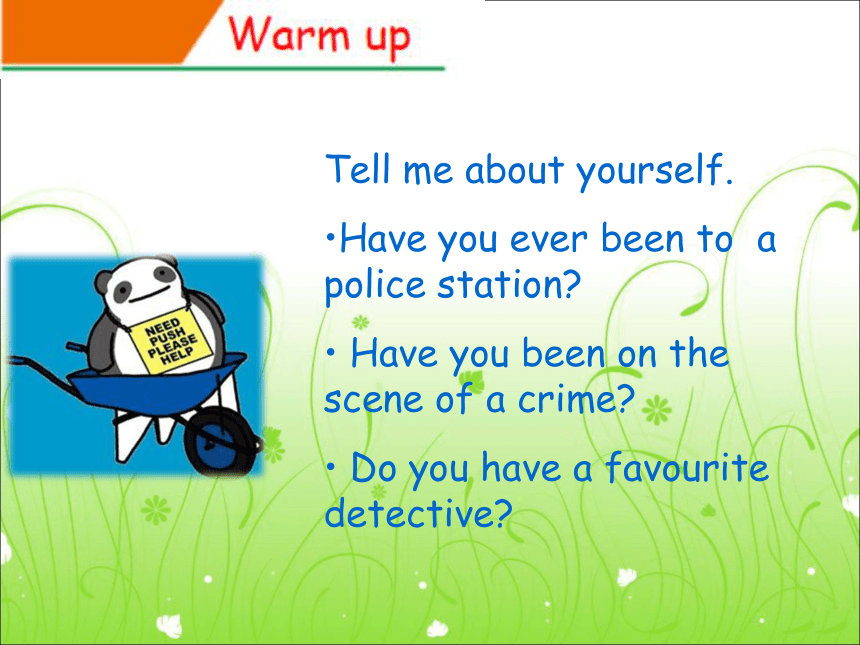



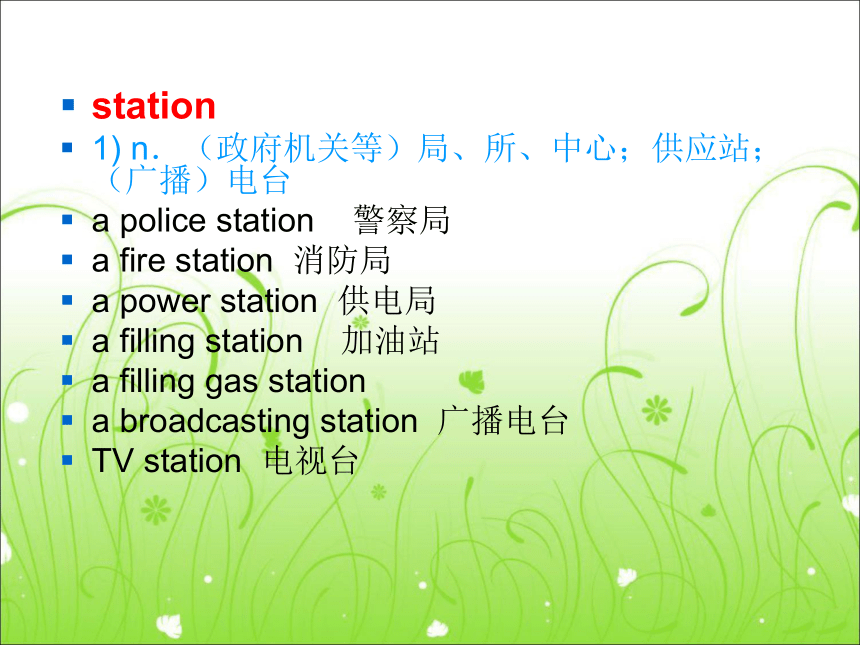
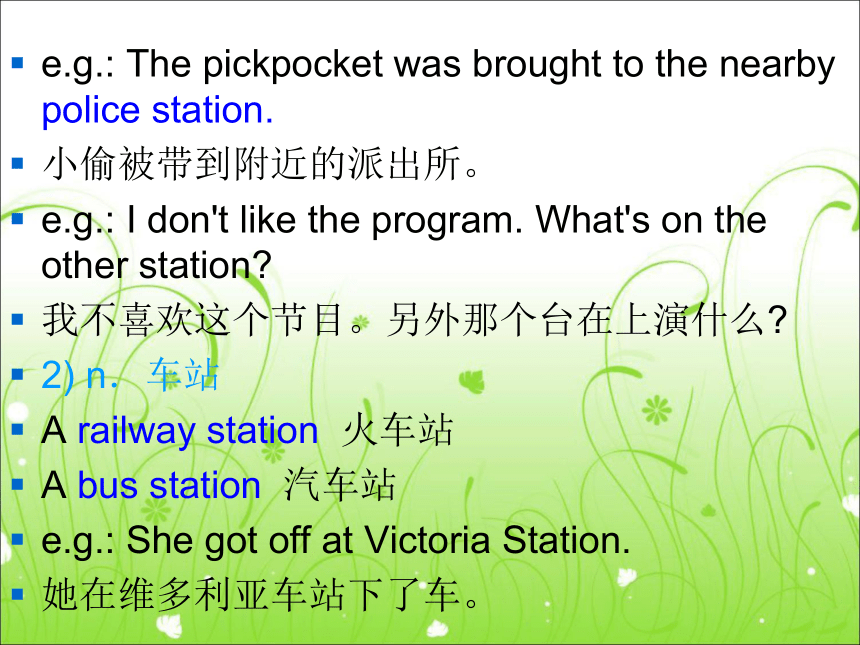




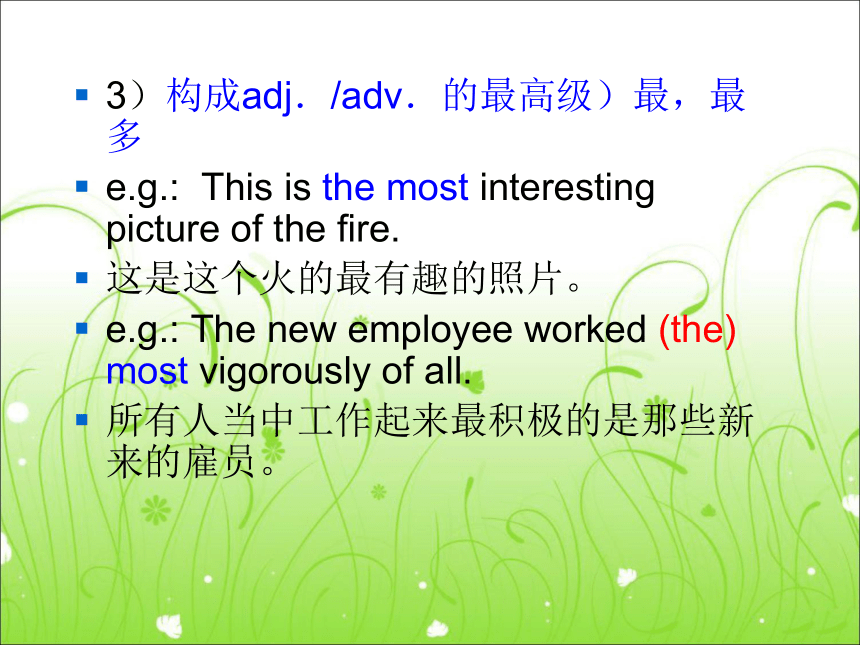
文档简介
(共57张PPT)
Lesson 34
Quick Work
By Tina
Tell me about yourself.
Have you ever been to a police station
Have you been on the scene of a crime
Do you have a favourite detective
New words and expressions
station ['stei n] n.(警察)局
most [m ust] ad.相当,非常
station
1) n.(政府机关等)局、所、中心;供应站;(广播)电台
a police station 警察局
a fire station 消防局
a power station 供电局
a filling station 加油站
a filling gas station
a broadcasting station 广播电台
TV station 电视台
e.g.: The pickpocket was brought to the nearby police station.
小偷被带到附近的派出所。
e.g.: I don't like the program. What's on the other station
我不喜欢这个节目。另外那个台在上演什么
2) n.车站
A railway station 火车站
A bus station 汽车站
e.g.: She got off at Victoria Station.
她在维多利亚车站下了车。
3) station to station
打长途电话时,不管对方由谁接听,电话接通即开始计费
person to person
只有指定的对象接听电话时才付费
most
1) adv.相当,非常(用于加强语气;修饰adj.前面可加不定冠词)
e.g.: Dan was most surprise when he-heard the news.
当Dan听到这个消息时非常吃惊。
e.g.: This is a most useful book.
这是一本非常有用的书。
e.g.: He was most polite to me.
他对我非常礼貌。
most与very区别:
most:表示观的感情, 见解
e.g.: He was most kind to me.他对我非常好。
very:客观的陈述
e.g.: He is very tall. 他非常高。
2) adv.最(修饰动词,但不放在动词和它的宾语之间)
e.g.: What' s troubling you most
什么事情令你最麻烦?
e.g.: What most pleased me was that. . . . .
e.g.: What pleased me most was… 令我最高兴的事是。
3)构成adj./adv.的最高级)最,最多
e.g.: This is the most interesting picture of the fire.
这是这个火的最有趣的照片。
e.g.: The new employee worked (the) most vigorously of all.
所有人当中工作起来最积极的是那些新来的雇员。
4) many和much的最高级many--more--most
much--more--most
5) most绝大多数的(前面不加冠词)
e.g.: Most of the boys like football.
大多数的男孩喜欢足球。
e.g.: Most of them were late.
他们中的大多数都迟到了。
Language points
the local police 当地警察局
1)地方的,本地的,地区的(尤作定语)
belonging to a particular place or district
属于某个特殊的地方或区域
local news 当地新闻
a local station 地方的一个车站
local farmers 当地的农民
1.Last Tuesday he received a letter from the local police.
local government 当地政府
local time 当地时间
local color 地方特色
2)(身体)局部性的
a local pain 局部疼痛
3) a local line 支线
a local train 普通列车
2.…… has been worried all week.
现在完成时表示过去一直延续到现在,并有可能继续延续下去的动作。
be worried about sth. 对…感到担心
be anxious about sth. 对…感到焦虑
all week 整整一个星期
all day long 整整一天
all year round 整年
all day and all night 整日整夜
worry
★Worry: n
Too much worry had made him look an old man.
Life is full of worries.
人生总是荆棘满途。
★worry. vi/vt
Don’t worry about the little things.
Don’t worry. We have plenty of time.
Don’t worry about me, I’ll be all right.
He is always worrying about his weight/height.
3.In the letter he was asked to call at the station.
(1)call at表示"对(某个人家或地方)进行短暂访问":
He calls at every house in the street once a month.
他每月对这条街上的每户人家光顾一次。
He was asked to call at the police station.
他被告知去警察局一趟。
(2)call on 表示"拜访"、"探望":
Have you called on George recently
你最近去看过乔治吗?
(3)call out表示"大声叫喊":
Some people on the bank called out to the man in the boat.
岸上的一些人对着小船上的那人高喊。
(4)call up在美国英语中表示"打电话(给某人)":
Jane called me up the other day.
前几天,简给我打过电话。
If you want my help, just call up.
你如果需要我的帮助,来个电话就行。
(5)call off 可以表示"取消(某项活动)":
For some reason, they have called off the party / the meeting.
由于某种原因,他们把晚会/会议取消了。
It began to rain so we called off the match.
The couple decided to call off their reservation.
I called ____ you five times yesterday. Were you out
It’s too late go to dinner. Why don’t we call the whole thing ___
We called ____ to him but he could not hear us.
I called ____ the post office on my way to work.
“Help!” the injured called ____to the rescue team.
on
off
out
at
out
4. Dan wondered why he was wanted by the police, but he went to the station yesterday and now he is not worried any more.
wonder v. (want to know)
1. + (that) 从句
我想知道我们什么时候能够到达北京.
I wonder (that) when we can arrive in Beijing.
我想知道他到底会不会回来.
I wonder whether he will come back or not.
2. + to / at 感到惊讶
我听到隔壁传出她的声音, 十分惊讶.
I wondered to hear her voice in the next room.
wonder: +at/ about 感到惊讶,感到奇怪
我惊叹他们的速度之快. 我总觉得那件事很莫名其妙.
I wondered at their fast speed.
I was wondering about that thing.
n [C]. thing or event that causes the feeling
世界七大奇迹 The seven wonders of the world
be wanted on the phone
这就是警察在追捕的那个人。
This is the man who is wanted by the police.
police集合名词(谓语动词为复数)
a policeman 一个男警察
a police woman 一个女警察
not anymore;不再
/no more /not any longer/no longer
例: I won't see you anymore.
I will see you no more. 我不会再见你了。
He is not handsome any more. 他不再瀟洒了。
He is not wealthy any more. 他不再富有了。
I won,t torture you any more. 我不会再折磨你了。
not…any more: 不再……
我不能再见你了。
I can’t see you any more.
我不能再等了。
I can’t wait any more.
他不再是个年轻人了。
He is not a young man any more.
not…any more=no more
not …any longer=no longer
a smiling policeman
一位面带笑容的警察。
smiling 为现在分词,作定语,
其作用相当于形容词。还可以说:
a sleeping dog 一只睡着的狗
a worried face 一张焦虑的脸
5.At the station, he was told by a smiling policeman that his bicycle had been found.
Pick up……
拿起,拾起:
I picked up the receiver as soon as the phone rang.
电话铃一响,我就拿起了话筒。
2) 用车接人:
I’ll pick you up at your office.
我来办公室接你。
6.Five days ago, the policeman told him, the bicycle was picked up in small village four hundred miles away.
3) (不经意) 学到:
She picked up French in Paris.
她是在巴黎学会法语的。
4)(无意地,顺便地)获得,找到:
Where did you pick up that book
你在哪儿买到那本书的?
I've picked up a bad cold.
我得了重感冒。
5). 使好转,改进,增进……
Sue was able to pick up her health under the help of the doctor.
The train is slowly picking up speed.
7.It is now being sent to his home by train.
by train 坐火车
by bus 坐公共汽车
by road 通过陆路
by sea 通过水路
by air 通过飞机
expect …to …
expect +that
He never expected that the bicycle would be found.
He never expected that the police would find the bicycle.
8.Dan was most surprised when he heard the news. He was amused too, because he never expected the bicycle to be found.
expect sb. to do sth. 期望某人做某事
翻译:我们都期望她获得这个奖。
We all expected her to win the prize.
如果将此句型变为被动句,可以有两种形式:
1. sb. be expected to do sth.
She was expected to win the prize.
2. expect sth. to be done
We all expected the prize to be won by her.
amused
amuse v. 逗乐,使…快乐
amuse oneself 白娱白乐
例: Her story amused the children greatly.
她的故事令孩子们非常开心。
amused adj.愉快的,开心的,好玩的
例: He had an amused look on his face.
他的脸上有着非常愉快的农情。
amusing adj. 令人好笑的
an amusing story令人好笑的故事
interesting- interested
令人有趣的 感到有趣的
surprising---- -surprised
令人吃惊的 感到吃凉的
exciting--- - excited
令人兴奋的 感到兴奋的
9.It is now being sent to his home by train.
现在进行时的被动语态?
长江上正在修建另一座大桥。
Another bridge is being built over the Changjiang River.
我校正在举行运动会。
The sports meeting is being held in our
school.
现在学生们正在打扫教室。
The classroom is being cleaned now.
l. Dan has been worried all week and he' s ____ worried.
A. even B. still C. yet D. anymore
分析:
C.yet和D.anymore通常用于否定句只能够;
A.even表示“甚至”通常和比较级连用,不符合题义:
B.still用在肯定句众表示“仍旧,仍然”,是个副词.
B
2. All the police at the station are ____ men.
A. topical B. local C. native D. neighborly
分析:
A.话题的,典型的 B.地方的,当地的; C.出生地的,本地的,本国的:D.友好的,睦邻般的。
B
3. The police wanted Dan to call at the station. They wanted him to call ____ them.
A. at B. in C. on D. up
分析:
call on sb表示“拜访某人”;
A.call at后面应该加地点,表示“参观某地,拜访某地”,而不应该跟人:
B.call in是个错误搭配:
D.call up表示“打电话“的意思。
C
4. The government is ____ to reassure everyone that the situation is under control.
A. worried B. anxious C. concerned D. desirable
分析:
A.闷闷不乐的,担心的; B.挂念的,担忧的,渴望的; C。 关心的,有关的: D.值得要的,含意的。
A.和B.可以表示对未来不确定的事件或事情感到不安的或忧虑的:worried无这样的含义。
B
Grammar
被动语态
Be+过去分词,时态通过be体现。
1.被动语态除常用be加过去分词外,还可用get加过去分词(用于口语中)
例: Hundreds of people get killed every years by traffic on the roads.每年都有很多人死于交通事故中。
The boy got hurt on his way to school.
那个男孩在上学的路上受伤了。
2. 主+谓十复合宾语(宾语+宾语补足语)变为被动结构时,只将主动结构中的宾语变为被动结构中的主语,宾语补足语不变。
例:They choose Harry captain. 他们选Harry当船长
Harry was chosen captain, Harry被选做船长。
We asked the teacher to explain the difficult sentence again.
我们请老师把那个难的句子再解释一遍
The teacher was asked to explain the difficult sentence again.
老师被要求把那个难句子再解释一遍。
We found him lying on the floor. 我们发现他躺在地板上。
He was found lying on the floor. 他被发现躺在地板上。
3.以下情况中,主动句一般不能变为被动句。
1)谓语为不及物动词。
例:The puppy died. 小狗死了。
2)谓语为及物动词leave, enter, reach, resemble, become,suit, benefit, lack等
leave Beijing 离开北京
enter the boss,s office 进入老板办公室
3)不可拆开的动词短语。
take place 发生
lose heart 灰心丧气
change color 改变颜色
belong to 属于
consist of 由…组成
Grammar
Passive voice 被动语态
一般现在时被动:主语+bedone
一般过去时被动:主语+was/were done
一般将来时被动:主语+will/shall be done
现在进行时被动:主语+be being done
现在完成时被动:have/has been done
Thank you!
Lesson 34
Quick Work
By Tina
Tell me about yourself.
Have you ever been to a police station
Have you been on the scene of a crime
Do you have a favourite detective
New words and expressions
station ['stei n] n.(警察)局
most [m ust] ad.相当,非常
station
1) n.(政府机关等)局、所、中心;供应站;(广播)电台
a police station 警察局
a fire station 消防局
a power station 供电局
a filling station 加油站
a filling gas station
a broadcasting station 广播电台
TV station 电视台
e.g.: The pickpocket was brought to the nearby police station.
小偷被带到附近的派出所。
e.g.: I don't like the program. What's on the other station
我不喜欢这个节目。另外那个台在上演什么
2) n.车站
A railway station 火车站
A bus station 汽车站
e.g.: She got off at Victoria Station.
她在维多利亚车站下了车。
3) station to station
打长途电话时,不管对方由谁接听,电话接通即开始计费
person to person
只有指定的对象接听电话时才付费
most
1) adv.相当,非常(用于加强语气;修饰adj.前面可加不定冠词)
e.g.: Dan was most surprise when he-heard the news.
当Dan听到这个消息时非常吃惊。
e.g.: This is a most useful book.
这是一本非常有用的书。
e.g.: He was most polite to me.
他对我非常礼貌。
most与very区别:
most:表示观的感情, 见解
e.g.: He was most kind to me.他对我非常好。
very:客观的陈述
e.g.: He is very tall. 他非常高。
2) adv.最(修饰动词,但不放在动词和它的宾语之间)
e.g.: What' s troubling you most
什么事情令你最麻烦?
e.g.: What most pleased me was that. . . . .
e.g.: What pleased me most was… 令我最高兴的事是。
3)构成adj./adv.的最高级)最,最多
e.g.: This is the most interesting picture of the fire.
这是这个火的最有趣的照片。
e.g.: The new employee worked (the) most vigorously of all.
所有人当中工作起来最积极的是那些新来的雇员。
4) many和much的最高级many--more--most
much--more--most
5) most绝大多数的(前面不加冠词)
e.g.: Most of the boys like football.
大多数的男孩喜欢足球。
e.g.: Most of them were late.
他们中的大多数都迟到了。
Language points
the local police 当地警察局
1)地方的,本地的,地区的(尤作定语)
belonging to a particular place or district
属于某个特殊的地方或区域
local news 当地新闻
a local station 地方的一个车站
local farmers 当地的农民
1.Last Tuesday he received a letter from the local police.
local government 当地政府
local time 当地时间
local color 地方特色
2)(身体)局部性的
a local pain 局部疼痛
3) a local line 支线
a local train 普通列车
2.…… has been worried all week.
现在完成时表示过去一直延续到现在,并有可能继续延续下去的动作。
be worried about sth. 对…感到担心
be anxious about sth. 对…感到焦虑
all week 整整一个星期
all day long 整整一天
all year round 整年
all day and all night 整日整夜
worry
★Worry: n
Too much worry had made him look an old man.
Life is full of worries.
人生总是荆棘满途。
★worry. vi/vt
Don’t worry about the little things.
Don’t worry. We have plenty of time.
Don’t worry about me, I’ll be all right.
He is always worrying about his weight/height.
3.In the letter he was asked to call at the station.
(1)call at表示"对(某个人家或地方)进行短暂访问":
He calls at every house in the street once a month.
他每月对这条街上的每户人家光顾一次。
He was asked to call at the police station.
他被告知去警察局一趟。
(2)call on 表示"拜访"、"探望":
Have you called on George recently
你最近去看过乔治吗?
(3)call out表示"大声叫喊":
Some people on the bank called out to the man in the boat.
岸上的一些人对着小船上的那人高喊。
(4)call up在美国英语中表示"打电话(给某人)":
Jane called me up the other day.
前几天,简给我打过电话。
If you want my help, just call up.
你如果需要我的帮助,来个电话就行。
(5)call off 可以表示"取消(某项活动)":
For some reason, they have called off the party / the meeting.
由于某种原因,他们把晚会/会议取消了。
It began to rain so we called off the match.
The couple decided to call off their reservation.
I called ____ you five times yesterday. Were you out
It’s too late go to dinner. Why don’t we call the whole thing ___
We called ____ to him but he could not hear us.
I called ____ the post office on my way to work.
“Help!” the injured called ____to the rescue team.
on
off
out
at
out
4. Dan wondered why he was wanted by the police, but he went to the station yesterday and now he is not worried any more.
wonder v. (want to know)
1. + (that) 从句
我想知道我们什么时候能够到达北京.
I wonder (that) when we can arrive in Beijing.
我想知道他到底会不会回来.
I wonder whether he will come back or not.
2. + to / at 感到惊讶
我听到隔壁传出她的声音, 十分惊讶.
I wondered to hear her voice in the next room.
wonder: +at/ about 感到惊讶,感到奇怪
我惊叹他们的速度之快. 我总觉得那件事很莫名其妙.
I wondered at their fast speed.
I was wondering about that thing.
n [C]. thing or event that causes the feeling
世界七大奇迹 The seven wonders of the world
be wanted on the phone
这就是警察在追捕的那个人。
This is the man who is wanted by the police.
police集合名词(谓语动词为复数)
a policeman 一个男警察
a police woman 一个女警察
not anymore;不再
/no more /not any longer/no longer
例: I won't see you anymore.
I will see you no more. 我不会再见你了。
He is not handsome any more. 他不再瀟洒了。
He is not wealthy any more. 他不再富有了。
I won,t torture you any more. 我不会再折磨你了。
not…any more: 不再……
我不能再见你了。
I can’t see you any more.
我不能再等了。
I can’t wait any more.
他不再是个年轻人了。
He is not a young man any more.
not…any more=no more
not …any longer=no longer
a smiling policeman
一位面带笑容的警察。
smiling 为现在分词,作定语,
其作用相当于形容词。还可以说:
a sleeping dog 一只睡着的狗
a worried face 一张焦虑的脸
5.At the station, he was told by a smiling policeman that his bicycle had been found.
Pick up……
拿起,拾起:
I picked up the receiver as soon as the phone rang.
电话铃一响,我就拿起了话筒。
2) 用车接人:
I’ll pick you up at your office.
我来办公室接你。
6.Five days ago, the policeman told him, the bicycle was picked up in small village four hundred miles away.
3) (不经意) 学到:
She picked up French in Paris.
她是在巴黎学会法语的。
4)(无意地,顺便地)获得,找到:
Where did you pick up that book
你在哪儿买到那本书的?
I've picked up a bad cold.
我得了重感冒。
5). 使好转,改进,增进……
Sue was able to pick up her health under the help of the doctor.
The train is slowly picking up speed.
7.It is now being sent to his home by train.
by train 坐火车
by bus 坐公共汽车
by road 通过陆路
by sea 通过水路
by air 通过飞机
expect …to …
expect +that
He never expected that the bicycle would be found.
He never expected that the police would find the bicycle.
8.Dan was most surprised when he heard the news. He was amused too, because he never expected the bicycle to be found.
expect sb. to do sth. 期望某人做某事
翻译:我们都期望她获得这个奖。
We all expected her to win the prize.
如果将此句型变为被动句,可以有两种形式:
1. sb. be expected to do sth.
She was expected to win the prize.
2. expect sth. to be done
We all expected the prize to be won by her.
amused
amuse v. 逗乐,使…快乐
amuse oneself 白娱白乐
例: Her story amused the children greatly.
她的故事令孩子们非常开心。
amused adj.愉快的,开心的,好玩的
例: He had an amused look on his face.
他的脸上有着非常愉快的农情。
amusing adj. 令人好笑的
an amusing story令人好笑的故事
interesting- interested
令人有趣的 感到有趣的
surprising---- -surprised
令人吃惊的 感到吃凉的
exciting--- - excited
令人兴奋的 感到兴奋的
9.It is now being sent to his home by train.
现在进行时的被动语态?
长江上正在修建另一座大桥。
Another bridge is being built over the Changjiang River.
我校正在举行运动会。
The sports meeting is being held in our
school.
现在学生们正在打扫教室。
The classroom is being cleaned now.
l. Dan has been worried all week and he' s ____ worried.
A. even B. still C. yet D. anymore
分析:
C.yet和D.anymore通常用于否定句只能够;
A.even表示“甚至”通常和比较级连用,不符合题义:
B.still用在肯定句众表示“仍旧,仍然”,是个副词.
B
2. All the police at the station are ____ men.
A. topical B. local C. native D. neighborly
分析:
A.话题的,典型的 B.地方的,当地的; C.出生地的,本地的,本国的:D.友好的,睦邻般的。
B
3. The police wanted Dan to call at the station. They wanted him to call ____ them.
A. at B. in C. on D. up
分析:
call on sb表示“拜访某人”;
A.call at后面应该加地点,表示“参观某地,拜访某地”,而不应该跟人:
B.call in是个错误搭配:
D.call up表示“打电话“的意思。
C
4. The government is ____ to reassure everyone that the situation is under control.
A. worried B. anxious C. concerned D. desirable
分析:
A.闷闷不乐的,担心的; B.挂念的,担忧的,渴望的; C。 关心的,有关的: D.值得要的,含意的。
A.和B.可以表示对未来不确定的事件或事情感到不安的或忧虑的:worried无这样的含义。
B
Grammar
被动语态
Be+过去分词,时态通过be体现。
1.被动语态除常用be加过去分词外,还可用get加过去分词(用于口语中)
例: Hundreds of people get killed every years by traffic on the roads.每年都有很多人死于交通事故中。
The boy got hurt on his way to school.
那个男孩在上学的路上受伤了。
2. 主+谓十复合宾语(宾语+宾语补足语)变为被动结构时,只将主动结构中的宾语变为被动结构中的主语,宾语补足语不变。
例:They choose Harry captain. 他们选Harry当船长
Harry was chosen captain, Harry被选做船长。
We asked the teacher to explain the difficult sentence again.
我们请老师把那个难的句子再解释一遍
The teacher was asked to explain the difficult sentence again.
老师被要求把那个难句子再解释一遍。
We found him lying on the floor. 我们发现他躺在地板上。
He was found lying on the floor. 他被发现躺在地板上。
3.以下情况中,主动句一般不能变为被动句。
1)谓语为不及物动词。
例:The puppy died. 小狗死了。
2)谓语为及物动词leave, enter, reach, resemble, become,suit, benefit, lack等
leave Beijing 离开北京
enter the boss,s office 进入老板办公室
3)不可拆开的动词短语。
take place 发生
lose heart 灰心丧气
change color 改变颜色
belong to 属于
consist of 由…组成
Grammar
Passive voice 被动语态
一般现在时被动:主语+be
一般过去时被动:主语+was/were done
一般将来时被动:主语+will/shall be done
现在进行时被动:主语+be being done
现在完成时被动:have/has been done
Thank you!
同课章节目录
